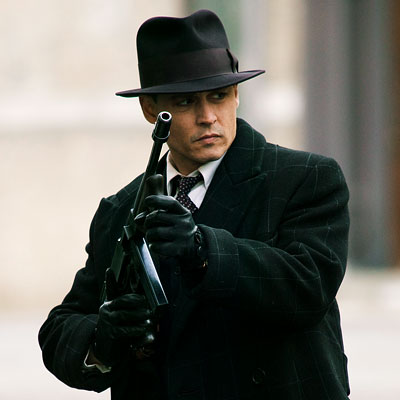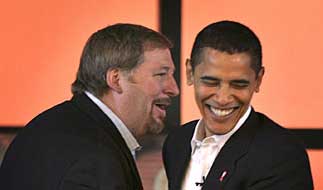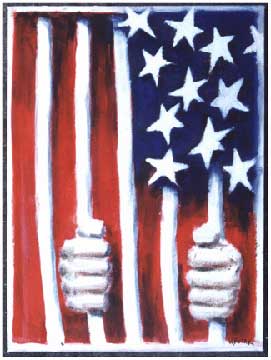Disheveled journalist Russell Crowe finds that the story of a murdered intern leads him (naturally) to a darker conspiracy in the new trailer for Kevin MacDonald’s State of Play. Based on the John Simm/David Morrissey/Bill Nighy BBC series, it also stars Ben Affleck, Rachel McAdams, Helen Mirren, Robin Wright Penn, Jason Bateman, Jeff Daniels, Harry Lennix…and neither Brad Pitt nor Edward Norton.
Month: January 2009
Rocket’s Red Glare, Meet Bombs Bursting in Air.
“‘An automated rendezvous does all sorts of things for your missile accuracy and anti-satellite programs,’ said John Sheldon, a visiting professor of advanced air and space studies at Maxwell Air Force Base in Alabama. ‘The manned effort is about prestige, but it’s also a good way of testing technologies that have defense applications.‘” In order to keep pace with the increasingly proficient Chinese space program, President-elect Obama may be considering retying NASA to the Pentagon, “because military rockets may be cheaper and ready sooner than the space agency’s planned launch vehicle, which isn’t slated to fly until 2015…Obama has said the Pentagon’s space program — which spent about $22 billion in fiscal year 2008, almost a third more than NASA’s budget — could be tapped to speed the civilian agency toward its goals as the recession pressures federal spending.”
Hmm. On one hand, I would think making NASA yet another fiefdom of the Pentagon would greatly facilitate its ability to lock down the funding it needs for various exploratory endeavors, recession or no. And if the types of conveyance vehicles NASA needs are basically sitting around gathering dust in some Pentagon-owned warehouse next to the ark of the covenant, well then it only makes sense to combine the two programs. No need to reinvent the, uh, rocket.
On the other hand, putting the brass in charge is probably going to have deleterious effects on the types of projects NASA pursues in the future. And, in a perfect world, there’s something to be said for having a civilian space program completely outside the purview of the military. In fact, now that i think about it, won’t combining the Pentagon and NASA space programs cut back on the types of international cooperation that have guided our efforts in space in recent years? Given the current economic climate, I guess this is the best way for NASA to continue pursuing its goals in the short term. Still, there could well be trouble ahead.
The New Thirty.

Hentoff Sent Off.
“With all due immodesty, I think it doesn’t help to lose me because people have told me they read The Voice not only for me, but certainly for me.” In another troubling indicator of how bad things are getting in the world of print journalism, the venerable institution Nat Hentoff is laid off from The Village Voice. “‘Nat Hentoff wrote liner notes for every great musician that I’ve ever loved, from Billie Holiday to Bob Dylan and Aretha Franklin, and that’s not even what he’s been writing about for the last 30 years,’ said Tom Robbins, a Voice staff writer.”
A Farewell to “Sen. Oddball.”
“I always let the other fellow have my way.” Sen. Claiborne Pell (D-RI), 1918-2009. “[H]e was best known for his sponsorship of the 1972 program that has helped 54 million low-income and moderate-income students attend college. He also sponsored the legislation that founded the National Endowment for the Arts and Humanities.”
A Rose By Any Other Name.

So I take it y’all have been following the recent outrage in Empire State politics: A woman who’s never held any kind of elected office but happens to have a big, important surname just up and decides she’d like to be the Senator from New York. To accommodate this sudden quasi-royal prerogative, other deserving candidates in the Democratic party are completely shunted aside, including some who’ve spent their entire careers in public service. And, here’s the real kicker: At the end of the day, despite having very little to show for her legislative career, this well-named woman is for some reason made Secretary of State.
Ok, I’m partly kidding. Nonetheless, I find the recent furor over Caroline Kennedy’s possible two-year appointment to the New York Senate to be a bit willfully obtuse about both recent events and the former occupants of that Senate seat. Even the obvious Clinton analogy notwithstanding, lest we forget: Longtime Massachusetts resident Bobby Kennedy was only tangentially qualified for a New York Senate seat in 1964, and even his brother Teddy was basically appointed the first time ’round. And, besides, if Clinton’s perch doesn’t go to Mrs. Kennedy, who then is waiting in the wings? Well, most likely, Andrew Cuomo. A real bootstrapper, that one.
Don’t get me wrong: In principle, I’m dead set against the idea of Senate seats being doled out on the basis of familial connections. It’s an ugly, monarchical habit, and if the seat ends up going to a relatively unknown pol who’s paid their dues (a la Nita Lowey, who got pushed out for Clinton in 2000), all the better. Still, I’m inclined to think charitably of Caroline Kennedy for several reasons other than her name and historic lineage: her early advocacy of Sen. Obama and the good work she’s done for my sister’s organization over the years, to name just two. And, if Gov. Patterson were to end up choosing her…well, ok. I can think of more egregious injustices in this world. To watch the TNR gang throw an extended fit about it, or read Salon hackmeister Joan Walsh (who, by the way, penned an extraordinarily self-serving 2008 retrospective this past week) put down her Clinton pom-poms for a second to tsk-tsk the Kennedy “celebrity” candidacy is, in a word, irritating.
Regarding Harvey. | (And Rick.)

“My name is Harvey Milk, and I want to recruit you.” So began the oft-repeated speel of the San Francisco city supervisor and “Mayor of Castro Street,” who, in 1977 and after several attempts, became the first openly gay official elected to office in the US. But, seven years before those heady days, Milk (Sean Penn) was just a 40-year-old insurance man (and Republican, even), living a closeted life of quiet desperation in NYC. After a chance encounter and illicit proposition becomes an impromptu birthday party, Milk and new beau Scott Smith (James Franco) fall in love, talk about starting over, and decide to go West. Life is peaceful there…or is it? Even as Milk’s camera shop in the gay-friendly Castro district becomes a salon of artists, thinkers, and free spirits, bigotry is rampant even in the streets of San Francisco, and the cops at best turn a blind eye to — and at worst actively participate in — antigay violence. No more, says Milk. Taking a page from the ethnic political machines of an earlier century, he organizes Castro’s gays and lesbians into first a protest movement and then an organized voting and boycotting bloc. And when a redistricting plan emphasizing community self-rule in San Francisco is put into effect, Milk becomes an actual, legitimate political wheeler-and-dealer, with all the benefits and aggravations attending. (For more on the man and the movement, see the 1984 documentary The Times of Harvey Milk, now on Hulu for free.)
But, even as Harvey Milk rises to power in San Fran, a parallel movement stirs amid the churches and suburbs of Orange County. Led by former beauty queen, singer, and orange juice shiller Anita Bryant, the ever-so-Christian “Save Our Children” campaign gathers steam across the nation in its quest to roll back what meager protections gays and lesbians have managed to establish over the years. And when conservative state senator John Briggs (Denis O’Hare, seemingly forever destined to play assholes) brings the fight west in the form of Proposition 6, an initiative that would ban gays and lesbians from public schools, the battle for California is on. And even as Milk becomes the poster boy against Prop 6 and for recognizing gays and lesbians as full citizens and fellow human beings, he has to contend with trouble on the homefront — not only in his personal life (his new boyfriend Jack (Diego Luna) is more than a little erratic) but in his political backyard, where supervisor Dan White (Josh Brolin), from the Catholic, working-class district next door, is starting to act increasingly unstable. (But, I guess this is what happens when society is so permissive as to let a man get all hopped up on twinkies.)
Which reminds me: A word of appreciation for Josh Brolin’s work here. Sean Penn is garnering kudos across the board, and a likely Oscar nod, for his portrayal of Milk, and they’re very well-deserved. It’s really an astonishing transformation Penn accomplishes here — not so much because he’s playing someone who’s gay (homosexual), but because he’s playing someone who’s gay (happy).This is the same guy who sulked through Mystic River?) And, while Brolin will likely — and, imho, justifiably in the end — get edged out for Best Supporting Actor by Heath Ledger for The Dark Knight, his work here suggests he’s got some serious chops. At first it seems as if Brolin will just be coasting on his recent Dubya impression — another good-natured, hard-hearted conservative fratboy for the resume. Then, just as you think Brolin’s endangering himself in terms of typecasting, it’s suggested Dan White might also be a deeply repressed closet case. (I tend to find the argument that all frothing-at-the-mouth homophobes are in reality trapped in the closet to be too simplistic by half, but apparently there’s some grounding for it in White’s story. In any case, Brolin underplays it beautifully ) As Milk progresses, we begin to sense other reasons why White is such a strange and ultimately homicidal bird — he’s envious of Harvey, he feels personally screwed over by him, he’s something of a friendless wonder, he’s not the brightest bulb on the tree anyway, he feels trapped by, and powerless before, the authority figures in his life (his wife, his cop buddies, his church). Brolin lets all of this play out without tipping his hand in any one direction. It’s a subtle, complex, and very worthwhile performance, and it’s a testament to the film’s heart that it extends such empathy even to its ostensible antagonist.
Speaking of empathy, this isn’t at all a surprise coming from Gus Van Sant, always a very humanistic director, but it should be noted regardless: When it comes to full recognition of gays and lesbians, Milk laudably practices what it preaches. Jonathan Demme’s Philadelphia was good for its time, but nowadays (it’s on heavy rotation on AMC) it gives off a distinctly Guess Who’s Coming to Dinner? vibe. And, as I said when it came out, Ang Lee’s Brokeback Mountain often seemed “as somber, restrained, and delicate as Kabuki theater.” By contrast, the couples of Milk are passionate — both physically and emotionally — messy, flawed, and alive. Of course, there have been other well-rounded depictions of gays and lesbians in film in the past — in Van Sant’s earlier work, in the films of other gay directors like Todd Haynes, John Cameron Mitchell, and Kimberly Peirce, and in countless others. Still, Milk feels like an event of sorts. Unlike many of its forebears, it’s a mainstream Oscar-caliber movie that just takes its characters’ sexuality at face value and without apology. In that sense, it feels like a film whose time has come.
Which brings us to that Wal-Mart of spirituality, Rick Warren, who as you all know will be delivering the invocation at Obama’s inauguration this month, and who has said all manner of intemperate things about gays and lesbians (as well as jews, pro-choice voters, and others) in the past, even going so far as to campaign for Prop 8 in California two months ago.
Now, when the Rick Warren pick first came out, I didn’t say anything here for two reasons. One was deeply selfish: That was the week I was finishing up my speechwriting app, and it didn’t seem like the most opportune time to be too critical of the administration around here at GitM. (In the end, it didn’t matter anyway, of course.) More importantly, though, I am — and still partly remain — of the mind that the bigger picture needs to be kept in mind here. If it keeps the right-wing fundies relatively happy and docile, and helps them to buy into the notion of a post-partisan Obama presidency, then Rick Warren can give all the one minute ceremonial speeches he wants, so long as Obama ultimately shows himself a friend to gay and lesbian rights in his presidential actions.
But, there’s a sequence in Milk that brought me around a bit. When Dan White mentions the “issue” of gay rights in one crucial scene, Harvey replies: “These are not issues, Dan. These are our lives we’re fighting for.” And, put that way, the calculus changes. To straight progressive folk such as myself, one can easily — too easily — get to thinking of gay rights as an “issue” among many. But, for gays and lesbians all around the country, this is their lives. And, when considered thusly, the president of these United States — least of all a president who ran and won on a campaign of hope — should not be legitimizing bigotry, such as that continuously expressed by Warren without apology, in any kind of forum, let alone the most portentous and culturally significant inauguration in at least fifty years, perhaps ever.
In an eloquent column last week, the NYT‘s Frank Rich articulated basically where I stand on Obama’s decision at this point: His choice of Warren is “no Bay of Pigs. But it does add an asterisk to the joyous inaugural of our first black president. It’s bizarre that Obama, of all people, would allow himself to be on the wrong side of this history.” Let’s hope that Obama doesn’t follow in the footsteps of the last Democratic president, who very quickly started backpedaling on gay rights once in office, vis a vis “Don’t Ask, Don’t Tell.” And, while I’m sure he’s pretty busy these days, the president-elect (apparently a movie buff of sorts) could do worse than spend a few hours to reflect on the story of another community-organizer who believed in the transformative power of hope, who carried the hopes of his constitutents into higher office…and who faced unflinching and unwavering contempt from an irreconcilable opposition once he got there.
Webb takes on Incarceration Nation.
“I think you can be a law-and-order leader and still understand that the criminal justice system as we understand it today is broken, unfair, locking up the wrong people in many cases and not locking up the right person in many cases.” In an auspicious sign for 2009, Sen. Jim Webb (D-VA) announces he’ll be taking at stab at criminal justice and prison reform in the coming year. “Webb aims much of his criticism at enforcement efforts that he says too often target low-level drug offenders and parole violators, rather than those who perpetrate violence, such as gang members. He also blames policies that strip felons of citizenship rights and can hinder their chances of finding a job after release.“
It sounds like he’s on the right track, and bully to Sen. Webb for even taking this issue — normally not one that brings in the votes — on. (Let’s hope Webb knows his Wire.)
Of course, a lot of headway could be made if we just started taking a saner approach to drugs in this country, i.e. unclogging the justice system of non-violent drug offenders and doing away with mandatory minimums. From there, I hope Sen. Webb sets his sights on the shameful and grotesque private, for-profit prison industry that has sprouted here in America. I for one believe running an unsafe, substandard prison and getting rich by outsourcing your supply of “captive” laborers to corporations that don’t want to pay market wages is much more immoral and criminal behavior than getting high in some fashion and being unlucky (and/or black) enough to get caught. And I don’t think I’m in the minority in this assessment anymore.
Twelve for ’09.



On the occasion of the new year, EW previews some of the more-anticipated films of 2009, including Michael Mann’s Public Enemies, Terminator: Salvation, Spike Jonze’s’ long-awaited Where the Wild Things Are, Harry Potter and the Half-Blood Prince, Pixar’s Up, Harold Ramis’ Year One, The Taking of the Pelham 1-2-3 (again), Wolverine, and Watchmen.


